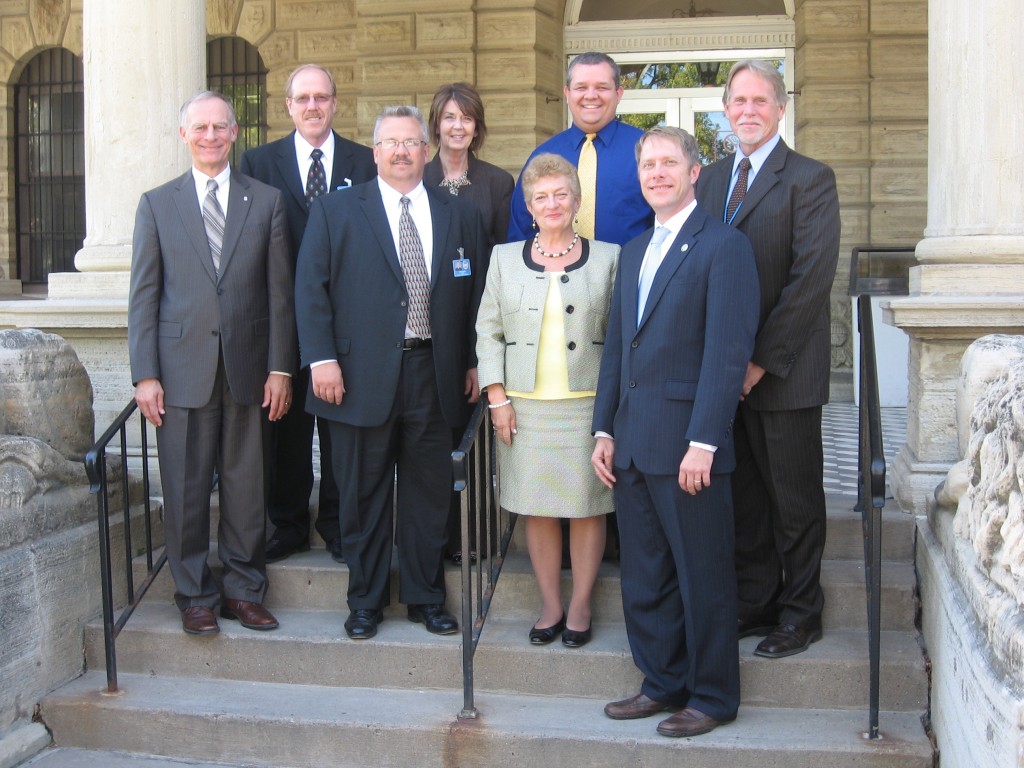Two young men, from different backgrounds, each tell a tragically similar story of their mistakes, which resulted in felony convictions and incarcerations. Their names aren’t important, but their stories are.
Both men are using education to take charge of their futures and be productive citizens.
During a recent trip to Iowa, Assistant Secretary for Vocational and Adult Education Brenda Dann-Messier and I met these men and several more like them, trying to make positive changes in their lives through education. We spent a day learning about adult education and corrections training programs in Cedar Rapids, before traveling to Dubuque for the Rural Community College Association’s annual conference.

Deputy Warden Bill Sperfslage, Anamosa Education Coordinator Mary Feeney-Wilfer, Kirkwood Community College High School Completion Director Marcel Kielkucki, Deputy Director of Offender Services Jerry Bartruff (front row) Kirkwood C.C. Executive Director of Government Relations Steve Ovel, Warden John Fayram, Assistant Secretary Brenda Dann-Messier, Deputy Assistant Secretary John White outside the Anamosa State Penitentiary in Anamosa, Iowa.
Having served their sentences and exited the correctional system, these two men now support each other and their fellow classmates in Kirkwood Community College’s Kirkwood Pathways for Academic Career Education and Employment (KPACE) program.
Kirkwood seeks to help lower-skilled, low-income adults, the unemployed and underemployed advance to successively higher levels of education, employment, and financial stability through the KPACE program. KPACE weaves together basic skills and workplace-readiness training, academics and certification attainment with support services through partnerships with the United Way of East Central Iowa and community-based organizations.
Believing that everyone’s situation is unique, Kirkwood has taken bold steps beyond simply offering courses and certifications. Kirkwood and its community partners, including United Way, are working with formerly incarcerated adults to make a successful re-entry into society.
According to the National Reentry Resource Center, federal and state corrections facilities held more than 1.6 million prisoners at the end of 2010 – approximately one of every 201 U.S. residents. At least 95 percent of state prisoners will be released back to their communities at some point.
The U.S. Department of Education recently released a new resource, Take Charge of Your Future, to help justice-involved adults connect to education and training opportunities. ED also provides funding for efforts to reduce recidivism by supporting in-prison education services through two formula grant programs: the Adult Education and Family Literacy Act and the Carl D. Perkins Career and Technical Education Act of 2006. A federal Office of Correctional Education was created in 1991 by the Perkins Act and currently resides in ED’s Office of Vocational and Adult Education.
Rapid increases in the U.S. prisoner population over recent decades have increased the need for educational services in correctional settings.
Inside and outside of Iowa’s Anamosa State Penitentiary, a maximum/medium security institution that currently houses more than 1,150 offenders, we witnessed the hope that literacy and job skills training can bring.
The Iowa Department of Corrections and Kirkwood Community College are working together to offer inmates opportunities to earn a GED, learn computer skills and programs, including the production and printing of books in brail for the blind, and trades that include welding and carpentry while behind bars.
Kirkwood is also working with its community partners to help ex-offenders find stable employment and housing—other key success factors—upon re-entry. Two hundred businesses have committed to hiring Kirkwood students, including ex-felons. The Corporation for National and Community Service’s AmeriCorps program and Volunteers in Service to America (VISTA) are providing social and educational services, and helping the community work on prison re-entry issues.
Community colleges have long offered innovative and valuable career training opportunities for youth and adults of all ages and in various stages of their lives. Kirkwood is offering solutions for safer communities through education and public-private partnerships.
John White is deputy assistant secretary for rural outreach at the U.S. Department of Education.





